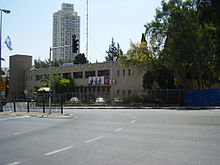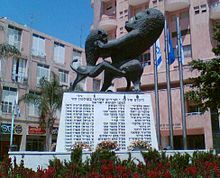- Dov Gruner
-
 Dov Gruner
Dov Gruner
Dov Gruner (Hebrew: דב גרונר) was a Jewish Zionist leader born in Kisvárda, Hungary on December 6, 1912. On April 19, 1947, he was executed by the British Mandatory authorities in Palestine on the charge of "firing on policemen, and setting explosive charges with the intent of killing personnel on His Majesty's service" in respect of his role in the pre-state Jewish underground known as the Irgun.
Contents
Early life
Bela Gruner (later Dov Gruner) was born to a religious family in Kisvárda, Hungary, where he attended a yeshiva. He later studied engineering in Brno.[1] In 1938 he joined the Zionist youth movement Betar, who arranged his passage to Palestine in 1940 aboard the illegal immigrant ship S.S. Skaria.
After spending six months in the Atlit detainee camp for his illegal entry into Palestine to escape the Nazis, he joined the Betar movement in Rosh Pina and became a member of the Irgun. In 1941, he joined the British army in order to join in their effort against the Nazi enemy, and together with his comrades in the Jewish Brigade came to the aid of Holocaust survivors in Europe.[2]
Irgun activities
After Gruner's demobilization from the army, in March 1946, he resumed his activity on behalf of the Irgun and joined its fighting force. While still on demobilization leave, he took part in an Irgun operation against an occupational military target to gain access to weapons from a British army depot near Netanya. Ten days later he participated in his second and final operation on behalf of the Irgun - the attack on a Ramat Gan police station. He was severely wounded and initially denied medical treatment. While in prison, he became close with some of his guards, who changed their views after meeting him.
When brought before the court and asked whether he admitted guilt he replied:
I do not recognize your authority to try me. This court has no legal foundation, since it was appointed by a regime without legal foundation.
You came to Palestine because of the commitment you undertook at the behest of all the nations of the world to rectify the greatest wrong caused to any nation in the history of mankind, namely the expulsion of Israel from their land, which transformed them into victims of persecution and incessant slaughter throughout the world. It was this commitment - and this commitment alone - which constituted the legal and moral basis for your presence in this country. But you betrayed it wilfully, brutally and with satanic cunning. You turned your commitment into a mere scrap of paper...
When the prevailing government in any country is not legal, when it becomes a regime of oppression and tyranny, it is the right of its citizens - more than that, it is their duty - to fight this regime and to topple it. This is what Jewish youth are doing and will continue to do until you quit this land, and hand it over to its rightful owners: the Jewish people. For you should know this: there is no power in the world which can sever the tie between the Jewish people and their one and only land. Whosoever tries to sever it - his hand will be cut off and the curse of God will rest on him for ever.
Death sentence
Refusing to partake in his own defense and refusing to co-operate with counsel he was said to have been offered a commutation on the condition that he admit guilt. He refused to do so and was given an uncommuted death sentence.
Despite the maximum security of his prison situation, Gruner maintained an irregular correspondence with Irgun headquarters. Among the correspondence between Gruner and headquarters were: His refusal of Irgun assistance with legal counsel (owing to his principled stand regarding non-cooperation with the British court system in Eretz Yisrael), his query whether he should commit suicide in order to make a political statement (the Irgun leadership quickly responded against the initiative) and most famously, what's believed to have been his final letter, shortly before he was to be hanged.
It was addressed to the Commander in Chief of the Irgun, Menachem Begin and it read:
Sir,
From the bottom of my heart I thank you for the encouragement which you have given me during these fateful days. Be assured that whatever happens I shall not forget the principles of pride, generosity and firmness. I shall know how to uphold my honour, the honour of a Jewish soldier and fighter.
I could have written in high-sounding phrases something like the old Roman "Duce est pro patria mori", but words are cheap, and sceptics can say 'After all, he had no choice'. And they might even be right. Of course I want to live: who does not? But what pains me, now that the end is so near, is mainly the awareness that I have not succeeded in achieving enough. I too could have said: 'Let the future take care of the future' and meanwhile enjoyed life and be contented with the job I was promised on my demobilization. I could even have left the country altogether for a safer life in America, but this would not have satisfied me either as a Jew or as a Zionist.
There are many schools of thought as to how a Jew should choose his way of life. One way is that of the assimilationists who have renounced their Jewishness. There is also another way, the way of those who call themselves 'Zionists' - the way of negotiation and compromise, as if the existence of a nation were nothing but another transaction. They are not prepared to make any sacrifice, and therefore they have to make concessions and accept compromises.
Perhaps this is indeed a means of delaying the end but, in the final analysis, it leads to the ghetto. And let us not forget this: in the ghetto of Warsaw alone, too, there were five hundred thousand Jews.
The only way that seems, to my mind, to be right, is the way of the Irgun Zvai Leumi, the way of courage and daring without renouncing a single inch of our homeland. When political negations prove futile, one must be prepared to fight for our homeland and our freedom. Without them the very existence of our nation is jeopardized, so fight we must with all possible means. This is the only way left to our people in their hour of decision: to stand on our rights, to be ready to fight, even if for some of us this way leads to the gallows. For it is a law of history that only with blood shall a country be redeemed.
I am writing this while awaiting the hangman. This is not a moment at which I can lie, and I swear that if I had to begin my life anew I would have chosen the exact same path, regardless of the consequences for myself.
Your faithful soldier, Dov.
Despite claims that Gruner was a Prisoner of War and was thus entitled to special rights, he was hanged at Acre prison on April 19, 1947, at the age of 35. Executed together with him were his Irgun colleagues Yehiel Dresner, Mordechai Alkahi and Eliezer Kashani.[3]
Commemoration
Moshav Misgav Dov, founded in 1950, is named after Gruner. Several streets in Israel, including one in the Armon HaNetziv neighborhood of Jerusalem, also bear his name. In 1954 the plaza in front of the Ramat Gan Police station was renamed "Gruner Square". A monument commemorating Gruner and the three Irgun members killed in the attack on the station was constructed at the site. The monument features a sculpture by Chana Orloff, depicting a young lion cub, representing the Yishuv, fighting a mature lion symbolizing the British Empire. The monument also bears a plaque commemorates all Olei Hagardom, Jewish pre-independence fighters executed by Ottoman and British authorities.
During the period 1950 to about 1956 in South Shore, then a Jewish neighborhood in Chicago, an AZA (Jewish boys club) was named after Gruner. This club won the Chicago AZA city championship in touch football, and was very popular in the high school social life of that neighborhood.
References
External links
- Dov Gruner at the Irgun website
Categories:- 1912 births
- 1947 deaths
- People from Kisvárda
- Hungarian Jews
- Zionism
- Palestine Emergency
- History of Israel
- Olei Hagardom
- Irgun members
- People executed by hanging
- People executed by the British Mandate for Palestine
Wikimedia Foundation. 2010.


